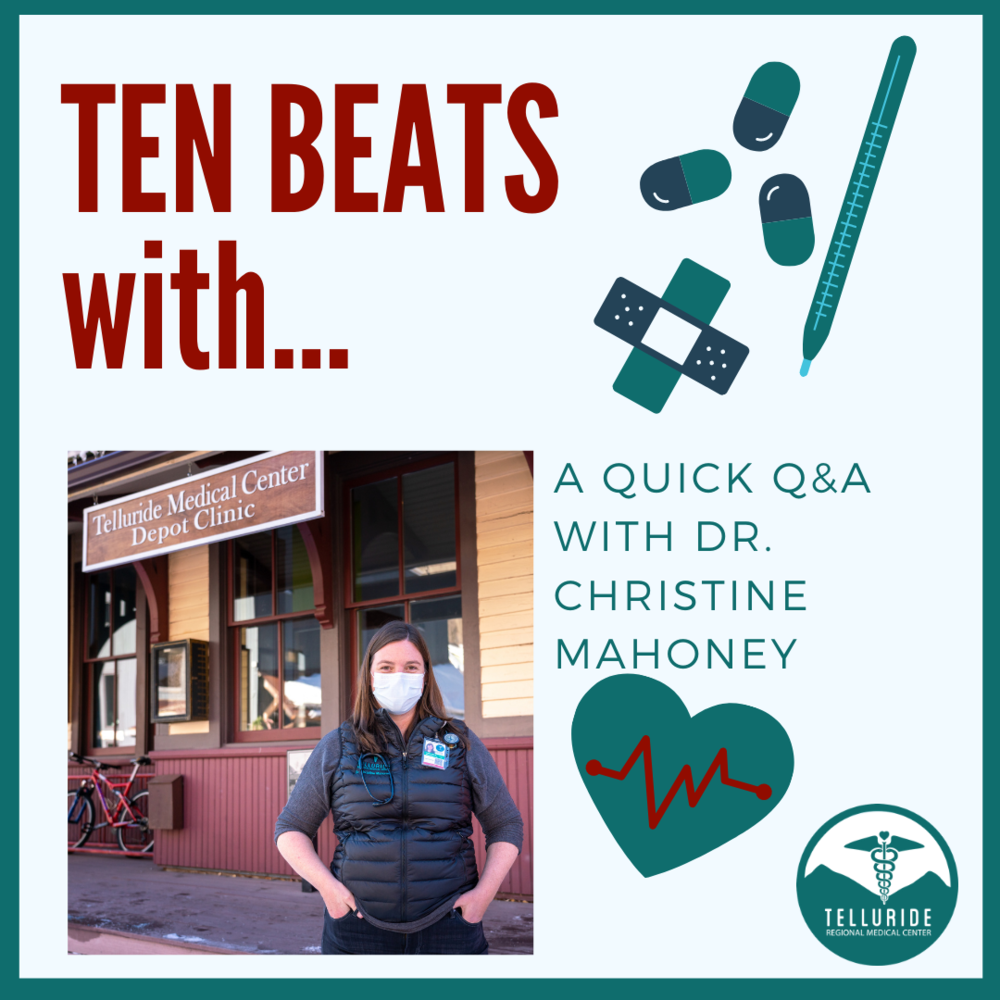
22 May Telluride Med Center: 10 Beats with Dr. Christine Mahoney!
Dr. Christine Mahoney, primary care director at the Telluride Regional Medical Center first heard of osteopathic medicine from her mentor while doing neuro-bio research. The overriding philosophy of “whole person” care spoke straight to her heart.
Get to know Dr. Mahoney, what husband says is her worst habit, plus why she believes primary care is shifting from hierarchical (paternal/patriarchal) to a more collaborative model in our new feature “Ten Beats With …”
Support Telluride Medical Center’s COVID Fund here.
Register for vaccine here.
For more information surrounding COVID resources, testing and the concern form, visit here.
For more information surrounding the state’s COVID-19 dial, visit here.
For additional Telluride Medical Center (TMC) information on COVID, go here

Ten Beats with Dr. Christine Mahoney
1. You practice Osteopathic Medicine, what is that exactly? It’s a modality within primary care that offers a “whole person” approach to medicine that focuses on the entire person, not just symptoms. In osteopathic medicine the person is seen as a unit of body, mind and spirit.
2. Why did you choose to study and practice osteopathic medicine? It was a mentor of mine who first introduced the idea to me after his own positive experience seeing a doctor of osteopathic medicine. I went straight to the University of Vermont library and checked out a book about Dr. Andrew Taylor Still, the founder of Osteopathic Medicine. One of the main tenets of osteopathic medicine is a belief that the body is capable of self-regulation, self-healing and health maintenance. This guiding principal continues to inspire me everyday.
3. What’s one thing you’d want the entire community to understand about osteopathic medicine? An osteopathic physician has the credentials D.O. An allopathic physician has the credentials M.D. Both credentials carry the same rights and privileges to diagnosis and treat disease, prescribe medicine, do surgery, etc. MD and DOs can both specialize in the same things. The difference goes beyond how we approach treatment. How DO’s and MD’s assess is different. DOs learn to listen with our hands, we look at the inter-relationship of structures on function and spirit and on disease for example.
4. For example? If I see a patient with chronic inflammation of the sinuses before looking at steroids or allergy medications, I’d be inclined to examine the patient’s head, neck and palate and the relationships to asymmetry in the cranial area to see if there adjustments or manipulations could support the body to heal itself.
5. Who else should consider an osteopathic medicine? Really anyone! Osteopathic Manipulative Medicine is not just for musculoskeletal injuries; the osteopathic approach can be very helpful with migraines; menstrual cramps; COPD; babies with trouble latching. The list goes on…
6. What excites you about the future of healthcare? Currently 1 on 4 U.S. medical students are studying osteopathic medicine — but in all areas of healthcare what I see is more appreciation for integrative approaches, more public health awareness and more whole-person focus. I also see patients engaged in their healthcare in a more active way. In other words, the patient-provider relationship in primary care is shifting from hierarchical (paternal/patriarchal) to collaborative.
7. What new habit have you picked up in the last year? Daily meditation.
8. Any bad habits? Yes, many. Per my husband, I don’t finish … [sentences].
9. What’s the most challenging part of practicing medicine? Our health insurance system. It causes moral injury to me to have a patient make choices about their care based on the cost. Our health insurance system as a whole is failing our patients and our health care workers.
10. Someday this community will someday have a new medical facility. When that day comes, what is it that you’re most excited about personally? Expanded services! I won’t have to drive 70 miles for my mammogram!
Two Bonus Beats:
1. One thing someone might be surprised to learn about you? I trained with Patch Adams.
2. Will shaking hands go the way of the phone booth? No.


Sorry, the comment form is closed at this time.